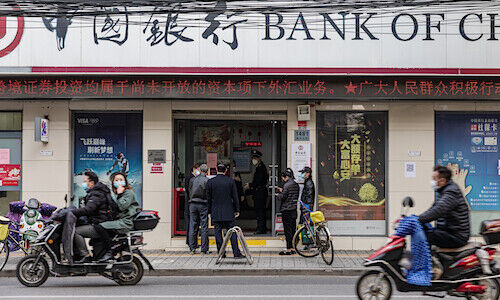Credit Crisis Concerns Climb in China
Electronic chip maker Tsinghua Group becomes the latest Chinese state-backed firm to face default risk as debt woes in the world's second-largest economy pile up.
In addition to slower growth caused by the pandemic, China’s state-owned companies are also learning to cope with the simultaneous challenge of tightened non-bank financing, commonly called «shadow banking».
Regulators had already announced a deadline extension of balance sheet cleanups to 2021-end after a top think tank signaled that compliance with the original 2020 target would be too difficult and called for a 2022 deadline.
And indeed, such industry leaders might be correct about balance sheet quality and default risks in the mainland with increasing fears that a credit crisis could now be in the making. finews.asia reviews the latest series of debt woes in mainland China.
Yongcheng Coal & Electricity Holding Group
The marquee bad debt headline was held by state-owned energy firm Yongcheng Coal & Electricity Holding Group, which defaulted on 1 billion yuan ($152 million) last Friday and sent coal miner bonds nationwide tumbling.
Executives from state parent Henan Energy and Chemical Industry Group were set to hold a meeting with major creditor banks in Henan province which was canceled after too many attendees appeared, reportedly out of fear the unrest could break out.
The abruptness of the matter took investors by surprise with Beijing-based credit rating agency, China Chengxin International Credit Rating (CCXI), still giving it a AAA top rating just last month. The firm has another 24.4 billion yuan ($24.4 billion)) worth of bonds outstanding including 6 billion yuan ($911 million) set to mature by the end of 2020, according to Bloomberg data.
Tsinghua Group
Today, chip maker Tsinghua Group becomes the latest state-backed entity to face default risks, according to a «Caixin» report (behind paywall), after it failed to win creditor approval to roll over 1.3 billion yuan ($197 million) of bonds that were due on Sunday.
Once again on Friday, Tsinghua Group held a meeting hosted by underwater Bank of Shanghai where it proposed to its bondholders that it repay 100 million yuan ($15 million) of principal first alongside a six-month deadline extension for the remaining balance.
Brilliance Auto Group
Also on Friday, a creditor filed for a request under China’s bankruptcy law to restructure Brilliance Auto Group, a state-backed automobile firm and BMW's main Chinese joint venture partner.
This follows a 1 billion yuan ($150 million) bond default in October, according to an exchange filing, by Brilliance Auto Groups which is backed by the Liaoning provincial government.
In September, there was also reportedly considerations to take the joint venture – Brilliance China Automotive Holdings Ltd – to the private market, in a move led by shareholders including top investor and state-controlled entity Liaoning Provincial Transportation Investment Group.
China Evergrande Group
Chinese property giant Evergrande was the first major entity to unveil its debt troubles which last month subsequently led investors to waive rights to $13 billion in repayment.
Not unlike many mainland developers, Evergrande is also dependent on the shadow banking channel with trust channels accounting for 41 percent of its total 799.8 billion yuan ($121 billion) in financing as of 2019-end, according to data provider Use Trust.
Evergrande’s ownership includes major state entities such Shandong Hi-Speed Group, the firm’s largest strategic investor, owned by the Shandong provincial government.
Baoshang Bank
Baoshang Bank has officially been recognized by regulators as insolvent and will not repay a 6.5 billion yuan ($987 million) bond or related interest, according to a filing on Friday to a domestic central banking entity.
The Inner Mongolian lender one of the three banks bailed out last year, alongside Bank of Jinzhou and Hengfeng Bank, after a state-backed publication detailed its participation in illegal financing to Tomorrow Group which totaled 156 billion yuan ($24 billion) through 209 shell companies and 347 loans.






















